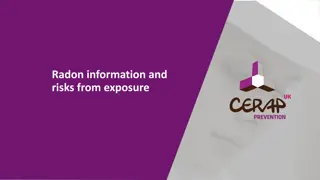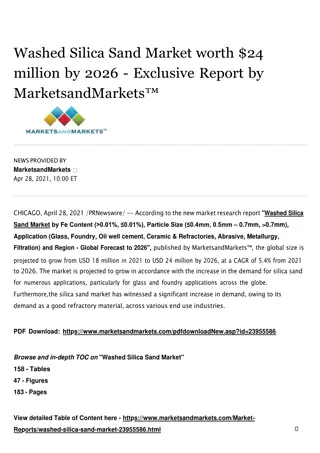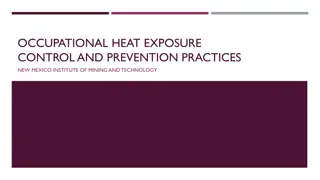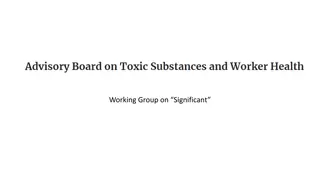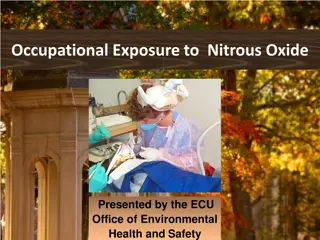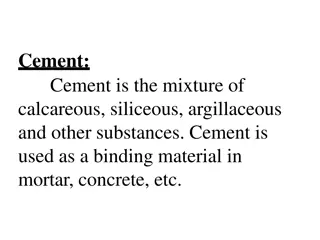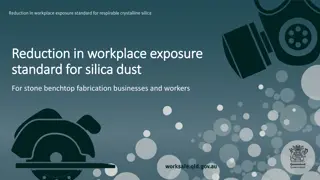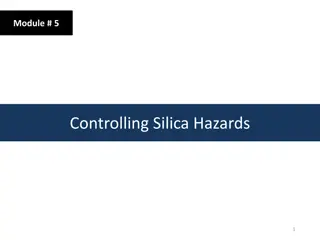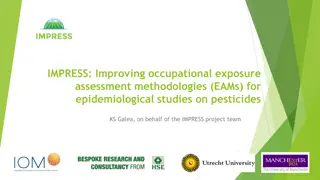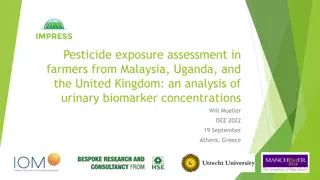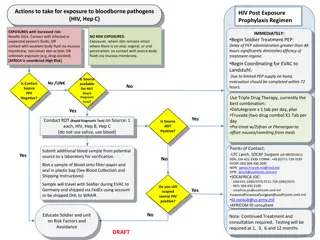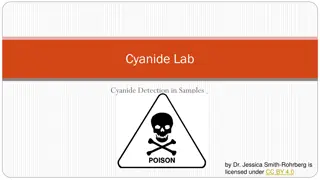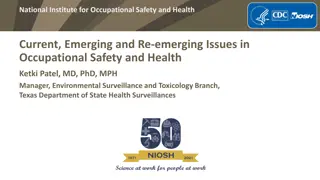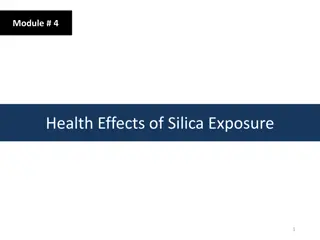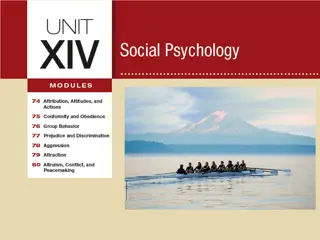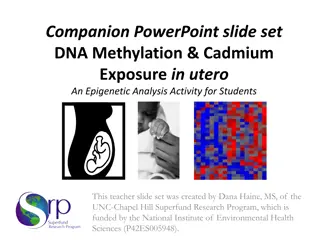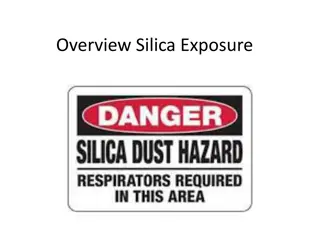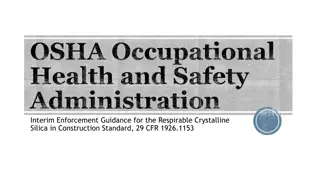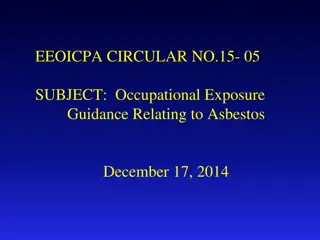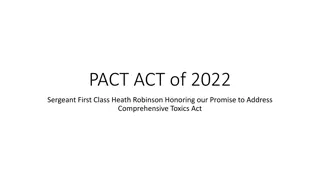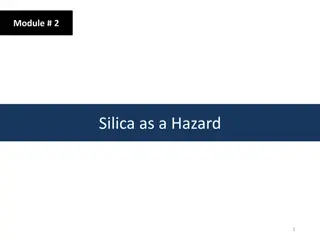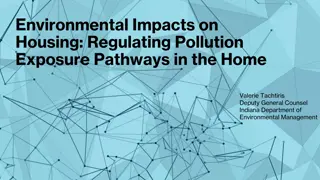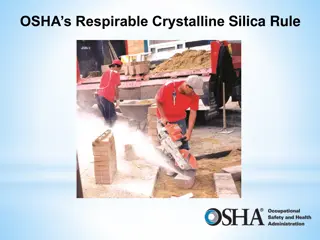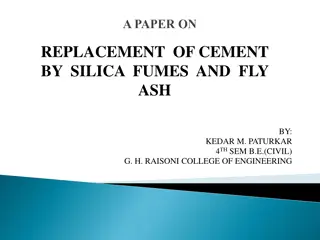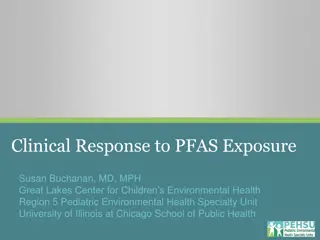Respirable Crystalline Silica
Respirable Crystalline Silica, found in various materials like concrete and sandstone, poses serious health risks when inhaled. Exposure can lead to silicosis, lung cancer, kidney disease, and other respiratory issues. This hazardous substance primarily affects workers in construction and general in
0 views • 66 slides
Impact of NVIDIA Stock Surge on Mutual Funds and Passive Funds Exposure
NVIDIA's stock surged by 16% following strong financial performance, impacting various mutual funds and passive funds. Mutual funds like Motilal Oswal, Mirae, and Franklin have significant exposure to NVIDIA, while non-broad-based passive funds also hold substantial positions. The exposure of broad-
4 views • 10 slides
Credit Finance Sub-Group and NPRR Updates
Updates from the Credit Finance Sub-Group include discussions on operational NPRRs, new invoice reports, EAL changes, and DC Energy's exposure calculations. The group considered improvements in credit implications, concentration limits, and more. NPRR 1186 was reviewed for enhancements to ESR monito
0 views • 12 slides
Understanding Radon Exposure Risks and Prevention Measures
Radon is a colorless, odorless radioactive gas present in rocks and soils. It can enter buildings through cracks and pipes, posing health risks like lung cancer. Exposure to radon can lead to radiation damage to cells and increase the risk of cancer. It's essential to be aware of radon levels in ind
1 views • 14 slides
Understanding NHANES Data for Environmental Exposure Studies
National Health and Nutrition Examination Survey (NHANES) is a crucial population-based survey in the U.S. that collects data on health and nutritional status. This data supports various applications, including assessing human exposure to environmental chemicals. NHANES conducts biomonitoring to qua
5 views • 27 slides
Washed Silica Sand Market: Growth, Trends, and Opportunities
The market is projected to grow in accordance with the increase in the demand for silica sand for numerous applications, particularly for glass and foundry application across the globe. Furthermore, the silica sand market has witnessed a significant increase in demand, owing to its demand as a good
3 views • 4 slides
Occupational Heat Exposure Control and Prevention Practices
Occupational Heat Exposure Control and Prevention Practices at the New Mexico Institute of Mining and Technology covers training for workers exposed to excessive heat, pre-test evaluation, objectives focusing on heat stress and exposure, understanding heat and heat stress, human body's response to h
1 views • 37 slides
Understanding the Significance of Exposure in EEOICPA Procedures
Delve into the complexities of exposure assessment in the context of EEOICPA procedures, examining the nuances of significant exposure levels and their impact on causation determination. Explore proposed recommendations for refining exposure assessment metrics to enhance causation evaluation.
0 views • 9 slides
Nitrous Oxide Occupational Exposure Guidelines and Monitoring
This information covers the occupational exposure to nitrous oxide, including its uses, chemical description, routes of exposure, health effects, monitoring methods, and regulatory exposure limits. Nitrous oxide is a colorless gas with various applications in medical, dental, and food processing ind
2 views • 18 slides
Understanding Radiation Safety for XL2 Analyzers
The Niton Model XL2 analyzer uses an X-ray tube that emits radiation when turned on, requiring adherence to the ALARA principle to minimize exposure. Factors like time, distance, and shielding play crucial roles in managing radiation exposure. Learn how to stay safe while using the XL2 analyzer to e
0 views • 11 slides
Overview of Cement: Types, Composition, and Functions
Cement is a vital building material consisting of various compounds like lime, silica, and alumina. It is used in mortar and concrete. The chemical composition of cement includes elements like iron oxide and gypsum. Different types of cement serve specific purposes such as rapid hardening or sulfate
0 views • 29 slides
Workplace Exposure Standard for Silica Dust in Stone Benchtop Fabrication
Reduction in workplace exposure standard for respirable crystalline silica dust has been implemented, halving the national standard to 0.05 mg/m3. The new standard aims to protect workers in stone benchtop fabrication businesses from serious lung diseases caused by breathing in silica dust. Employer
1 views • 8 slides
Understanding Occupational Exposure to Formaldehyde
Occupational exposure to formaldehyde is common in various industries and settings, including medical laboratories and mortuaries. Formaldehyde is used as a preservative, embalming agent, and in the manufacture of various products. It poses health risks through inhalation and skin exposure, potentia
0 views • 14 slides
Controlling Silica Hazards: Effective Engineering Controls
Techniques for controlling silica hazards in the workplace include elimination, substitution, and engineering controls like ventilation, dust containment systems, wet methods, and housekeeping practices. Elimination involves removing silica exposure risks, while substitution replaces risky materials
1 views • 21 slides
Enhancing Pesticide Exposure Assessment for Epidemiological Studies
Focuses on IMPRESS project aiming to improve methodologies for assessing occupational pesticide exposure in epidemiological studies. Reviews challenges in retrospective exposure assessment, proposes methodologies, and presents key project results to date, emphasizing the use of various exposure asse
1 views • 15 slides
Pesticide Exposure Assessment in Farmers from Malaysia, Uganda, and the United Kingdom
This study evaluates the impact of pesticide exposure on farmers' health in Malaysia, Uganda, and the UK using urinary biomarker concentrations. Multiple cohorts are analyzed to assess associations between exposure-modifying factors and urine metabolite measurements. The IMPRESS project focuses on i
0 views • 12 slides
Understanding Personal Exposure to Polybrominated Diphenyl Ethers (PBDEs)
This presentation explores the exposure of individuals to PBDEs in residential indoor air, highlighting the background, commercial uses, exposure pathways, and previous studies on PBDEs. It discusses the objectives, methods, results, and conclusions of a study aiming to quantify indoor air exposure
0 views • 22 slides
Photography Basics: Understanding Camera Exposure and Metering
Explore the fundamentals of camera exposure, including aperture, shutter speed, ISO, and metering modes. Learn how to control exposure settings, utilize different metering modes, and troubleshoot common exposure issues to enhance your photography skills.
0 views • 15 slides
Bloodborne Pathogens Exposure: HIV Post Exposure Prophylaxis Regimen
Take immediate action for exposure to bloodborne pathogens like HIV and Hepatitis C through a post-exposure prophylaxis (PEP) regimen. Administer PEP within 48 hours for increased-risk exposures like needle sticks or contact with infected fluids. Coordinate evacuation if needed and conduct Rapid Dia
0 views • 5 slides
Understanding Cyanide: Sources, Exposure, and Risks
Cyanide is a toxic compound found in various forms such as gases, solids, and liquids that can be harmful to humans and animals. Sources of cyanide exposure include natural processes, industrial activities, plant sources, and combustion products like cigarette smoke. The extent of poisoning depends
0 views • 14 slides
Occupational Pesticide Safety and Health Concerns
Occupational safety and health issues related to pesticide exposure are a significant concern globally. Limited surveillance data on pesticide exposure and related illnesses are available, with a high percentage of farmers being affected annually. Various occupations beyond farming also face potenti
1 views • 25 slides
Understanding the Health Effects of Silica Exposure
Silica exposure poses serious health risks as respirable crystalline silica particles can penetrate the body's natural defenses, leading to conditions like silicosis, tuberculosis, lung cancer, and chronic bronchitis. The silica particles that bypass initial defenses can cause inflammation and fibro
0 views • 17 slides
Understanding Attraction and the Mere Exposure Effect
Explore the dynamics of attraction and romantic love, delving into why we are drawn to certain individuals and how familiarity influences our feelings. Uncover key factors such as proximity, attractiveness, and similarity, along with the intriguing concept of the mere exposure effect, which elucidat
0 views • 37 slides
Understanding DNA Methylation and Cadmium Exposure in Utero: An Epigenetic Analysis
Explore the complex relationship between DNA methylation and in utero exposure to cadmium through a set of informative slides created by Dana Haine, MS. Learn about the impacts of DNA methylation on gene expression and how changes in methylation levels can lead to gene silencing or activation. Disco
0 views • 8 slides
Occupational Safety and Health Concerns with Crystalline Silica Exposure
Crystalline silica exposure poses serious health risks, including chronic silicosis, lung cancer, COPD, and kidney diseases. OSHA addresses this issue through programs like NEP, enforcing exposure limits, and requiring safety measures in the construction industry such as respiratory protection and e
0 views • 23 slides
Importance of Respirable Crystalline Silica Awareness in Construction
Understanding the hazards of respirable crystalline silica in construction is crucial for preventing serious health issues among workers. This guidance highlights the risks associated with silica exposure, the new enforcement rules, and the importance of implementing control measures to minimize exp
0 views • 7 slides
Occupational Exposure Guidance Relating to Asbestos
Asbestos-related diseases such as asbestosis, lung cancer, and mesothelioma pose risks to workers, especially those in specific occupations. The EEOICPA Circular No. 15-05 provides guidance on assessing potential asbestos exposure for Department of Energy (DOE) workers post-1986, emphasizing the nee
0 views • 18 slides
PACT ACT of 2022: Addressing Comprehensive Toxics Exposure for Veterans
The PACT ACT of 2022, spearheaded by Sergeant First Class Heath Robinson, aims to address comprehensive toxics exposure issues for veterans. The bill includes provisions such as expanded healthcare, improved VA services, recognition of burn pit exposure, enhancement of compensation for Persian Gulf
0 views • 22 slides
Understanding Silica Hazards in Construction Materials
Silica is a common hazard in construction materials, with around 2.3 million workers exposed to airborne silica dust. This dust can lead to silicosis and other lung diseases, posing health risks based on exposure levels and duration. Regulations like the permissible exposure limit (PEL) and time-wei
0 views • 11 slides
Understanding Economic Exposure in International Finance
Explore the concepts of economic exposure and translation exposure in international finance through a case study of Savor Co., a U.S. firm with business units in Europe. Learn how regression analysis is used to assess exposure to currency movements and identify potential hedging strategies to mitiga
0 views • 24 slides
Understanding Environmental Impacts on Housing: Regulating Pollution Exposure Pathways
Explore the regulatory framework for managing pollutant exposure in homes, highlighting the complexity of exposure pathways and the importance of assessing risks based on toxicity and exposure levels. The discussion covers various exposure pathways such as drinking water, air quality, dermal contact
0 views • 14 slides
Gas Processing: Dew Point Control and Refrigeration Systems
Gas processing involves gathering raw gas from wells, passing it through various units like feed gas receiving, condensate stabilization, gas treating, dew point control, and refrigeration units to control liquid condensation and recover natural gas liquids. Dew point control helps prevent condensat
0 views • 26 slides
Numerical Modeling for Hydraulic Fracture Prediction on Fused Silica Samples
Goal of the project is to predict the overpressures required to fracture fused silica cylindrical samples using numerical modeling. The study focuses on a homogeneous pure material with known mechanical properties compared to experimental results from a lab-scale stimulation system. The model includ
0 views • 7 slides
RF Exposure for Amateur Radio: Understanding Sources and Safety Measures
Exploring the various sources of RF exposure in relation to amateur radio, this comprehensive guide by Harold C. Fleischer, III AE5AS sheds light on different antennas like those used by AM, FM radio stations, TV stations, MW telecommunications, police, taxis, and even Wi-Fi routers. Each image show
0 views • 39 slides
Environmental Remediation Using Silica/Silicates for Contaminant Oxidation
Utilizing silica and silicates as chemical oxidants in environmental remediation has been approved under the general WDR permit since 2010. With over 1,500 applications in the US and Canada, including 148 in California, these substances are known for their safety and effectiveness in contaminant oxi
0 views • 8 slides
OSHA's Respirable Crystalline Silica Rule Overview
Exposure to respirable crystalline silica can lead to serious health risks including silicosis, lung cancer, COPD, and kidney disease. The rule covers the scope of coverage, permissible exposure limits, exposure assessment methods, and requirements for construction sites. It emphasizes the importanc
0 views • 31 slides
Enhancing Concrete Strength and Durability with Silica Fume and Fly Ash
The research explores the use of industrial waste materials like fly ash and silica fume in concrete to improve its strength and durability. By replacing a portion of cement with these materials, the resulting concrete mix becomes stronger, more durable, and eco-friendly. Fly ash and silica fume con
0 views • 12 slides
Clinical Response to PFAS Exposure in the General Population
Exposure to PFAS (per- and polyfluoroalkyl substances) is prevalent among Americans, with pregnant women showing detectable levels. Screening for health effects of exposure includes assessing cholesterol, thyroid function, and other symptoms. There is no known safe level of PFAS exposure, and orderi
0 views • 14 slides
Understanding the Long-Term Effects of Lead Exposure
Lead exposure can have detrimental effects on individuals, especially children. From damaging neurons to causing behavioral issues and slow development, the impact of lead exposure can be severe. Prevention through identifying sources of exposure and living safely with lead is crucial. Lead test kit
0 views • 13 slides



